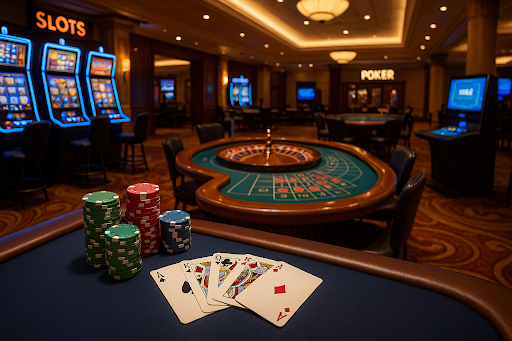Massachusetts Considers Legal Online Casinos, Ban on Sweepstakes Gaming

A new proposal in Massachusetts could reshape the state’s gambling industry by introducing regulated online casinos while simultaneously outlawing online sweepstakes platforms. Filed on August 18 by Rep. David Muradian, House Bill 4431 seeks to bring online casino gaming under state regulation while imposing a strict prohibition on sweepstakes-style games.
Currently under review by the Joint Committee on Economic Development and Emerging Technologies, the bill aims to direct players toward safer, regulated platforms while boosting state tax revenue and enhancing consumer protections.
iGaming Regulation Framework
If passed, the legislation would take effect on January 1, 2026, allowing online table games, slots, poker, and skill-based titles, all regulated by the Massachusetts Gaming Commission (MGC). Under the proposal, the state’s three licensed operators—Encore Boston Harbor, MGM Springfield, and Plainridge Park, would have the first opportunity to secure online casino licenses. Each operator could manage up to three skins, creating opportunities for partnerships with leading platforms such as DraftKings and FanDuel.
The bill proposes a 15% tax on adjusted gross revenue from online gaming. These funds would contribute to a Player Health Program designed to support responsible gambling, prevention, and treatment services.
To ensure a safer gaming environment, the proposal includes several safeguards:
- Credit card deposits would be prohibited.
- Marketing could not target under-21 audiences or college campuses.
- “Risk-free” language in promotions would be banned.
- Operators would use AI-driven tools to detect high-risk behaviors.
- A voluntary, national self-exclusion list would be implemented.
- Participation in multistate iGaming compacts, such as MSIGA, would be authorized.
Strict Ban on Online Sweepstakes
Alongside legalization, the bill calls for a complete ban on sweepstakes-style gaming. These platforms, typically offering casino-style games through dual-currency systems and awarding prizes based on chance, would become illegal to operate, advertise, or support within the state.
Violations carry significant penalties, including fines ranging from $10,000 to $100,000 for each offense, potential loss of gaming licenses, and up to two years in prison for repeat violations. The broad language of the bill also places affiliates, payment processors, and other supporting entities at risk of enforcement actions.
This approach mirrors recent legislative moves in Montana, Connecticut, and New Jersey, with similar proposals currently being reviewed in New York and California.
Industry Reactions and Market Context
The Social Gaming Leadership Alliance (SGLA) has openly opposed the bill. Executive Director Jeff Duncan criticized the proposal, stating, “Massachusetts has long been a hub of innovation, technology, and economic leadership, but this proposal sends the wrong message. A blanket prohibition on social games would strip away lawful entertainment, criminalize legitimate businesses, and undermine an industry that... could add to the state’s annual revenue.”
The legislative debate coincides with a slowdown in Massachusetts’ land-based casino revenue. In July 2025, total revenue reached $99.5 million, reflecting a minimal year-over-year increase of just 0.02%. Plainridge Park and MGM Springfield reported gains of 6.2% and 1.8%, respectively, while Encore Boston Harbor saw a 2.1% decline to $60.2 million, though it still represented more than 60% of the state’s overall casino revenue.
While slot revenue climbed to $72.2 million, table game earnings slipped to $27.3 million. Public sentiment toward gambling also appears to be shifting, with a recent survey indicating a rise in negative attitudes even as engagement with gambling activities remains strong.
Source:Massachusetts Bill Pushes for Online Casino Legalization, Sweepstakes Crackdown, LCB.org, August 24, 2025.








